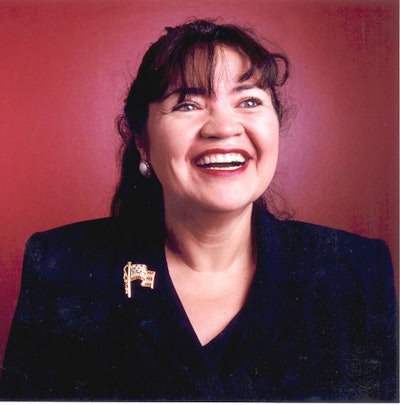As the American Association of Hispanics in Higher Education (AAHHE) commences its virtual conference this week, a familiar face will not be among the thousands of attendees.
Dr. Loui Olivas, the long-time executive director of the organization, stepped down over the summer. Dr. Lucia Gutiérrez has since been appointed to the position. It is unclear why Olivas, who has been a fixture at AAHHE for years, resigned from his post. When contacted, he declined to comment.
Natalia M. Toscano, chair of the graduate studies program at AAHHE and a Ph.D. student at the University of New Mexico, was “surprised” to learn that Olivas had stepped down.
 Norma V. Cantú
Norma V. Cantú“[He] has had a long history of commitment to supporting AAHHE and generations of Latinx scholars,” she said. “His hard work has culminated into an organization that is filled with dedicated members eager to continue the legacy set forward by Dr. Olivas.”
Norma V. Cantú, who previously served on AAHEE’s board of directors and is a law professor at the University of Texas at Austin, echoed Toscano’s praise of Olivas’ impact.
“Dr. Olivas did a phenomenal job in the early 2000s, creating academic space for young Latinx graduate students to find mentors and sponsors to pursue their research and their academic careers,” she said. “The notable results of Dr. Olivas’ focus on young academics was that AAHHE helped students complete their doctoral work.”
Now, under new leadership, the organization plans to create and expand on current leadership programs to include graduate students, mid-career administrators and early career faculty. Additionally, after recently partnering with management firm AMC Source, AAHHE aims to increase relationship building among its members and sponsors.
“The Board of Directors is very excited about the new direction, energy and synergy and is very appreciative of the founding members of AAHHE for its vision and commitment to the Latinx community in higher education,” said Dr. JoAnn Canales, immediate past chair of AAHHE’s Board of Directors and founding dean of graduate studies at Texas A&M University-Corpus Christi.
Changes have already been felt within the Graduate Student Fellowship program through “longer engagement of fellow community building and support,” according to Toscano.
“AAHHE has already commenced to transform and grow,” she said. “Alongside the ongoing mission to support current and rising Latinx scholars in the academy, I believe AAHHE will take a hands-on approach to address the structures that impede Latinx students into higher education. Supporting and equipping scholars to continue being agents of change.”
 Dr. Lucia Gutiérrez
Dr. Lucia GutiérrezCOVID-19 was among several topics of discussion during the first day of AAHHE’s conference titled “Sembrando Semillas: (Re) imagining the Contours of Latinx/a/o Communities within Higher Education.” Education Trust President and CEO Dr. John B. King, Jr. kicked off the conference with a keynote on Monday.
Through an analysis of a recent study, one session called attention to the experiences of Latinx students during COVID-19.
During the application process, students looked for schools that offered a sense of community, supported diverse populations and implemented response strategies to COVID-19.
However, once on campus, students remained concerned about being exposed to COVID-19 and held uncertainties about the structure of college relating to online learning, registration and housing.
To address these concerns in recruitment strategies, survey participants recommended that institutions provide more culturally responsive practices in information delivery for parents and present clearer messaging about housing, financial aid and other costs.
Dr. Blas Guerrero, director of strategic diversity recruitment initiatives and transfer programs at the University of California, Davis, recommended that Hispanic-serving institutions modify recruitment of Latinx students through “culturally relevant approaches” and do so equitably in a virtual setting. Additionally, outside of recruitment and enrollment strategies, institutions should alter their policies and practices to assist Latinx staff and students.
“How do we build that sense of a community,” he said. “How do we make sure that, what we are promoting as recruiters and out on the field, we can deliver once students get to campus? It is a big challenge. I never want to be able to tell a parent that we are going to take care of their children if we really can’t do that.”
Throughout the week, the conference will also highlight Latinx identity, experiences, advocacy, leadership, community partnerships, health and wellness. Alfredo Quiñones–Hinojosa, chair of neurosurgery and the William J. And Charles H. Mayo Professor at Mayo Clinic, are also among several of the speakers at this year’s conference.
“AAHHE’s mission remains grounded in its commitment to advancing opportunities for Latinx in higher ed,” said Canales. “It has remained steadfast in nurturing and cultivating new talent, increasing the pipeline of Latinx pursuing graduate degrees, faculty positions and administrative positions and recognizing outstanding achievements among the Latinx community.”
Sarah Wood can be reached at [email protected].


















